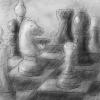Wasting potential, and seeking cloning
I had a vision of making a game about a cow that stands on two feet and wears shoes and gloves, and to make it a platformer like Sonic or Mario, in 3D, and put it on the Wii U since that's where it seems like the fans would be.
I made a 2D prototype of this game and it didn't impress me much. It just wasn't fun. So I scratched that and am thinking about making a "better" 3D game out of the prototype.
Recently, I feel like making another game though. A game that is like Final Fantasy VI but just enough not like it to not get sued. I feel that cloning a game is the best thing to do since all the money was already spent on the talent and you can use that collective talent as a guideline for how your game is, and hopefully make it good. Whereas if you make an original game, you risk making something sloppy or unprofessional. At least at my skill level, which is somewhere around novice.
I thought about just plopping this game on a platform that uses the Tegra 4, a chip which impresses me. Maybe that is too much power and I should just put it on the Ouya, where costs are low but so is profit.
I'm not sure what I want to do. I want to make something without spending code on a waste of a game. So I come to the creative minds here.
I'm not a designer, maybe a game design entusiast. That said, I think you should clone the game that you like, or some parts of it, and then work very hard to shape it in the way that you want. One shouldn't aim to make something original, because originality is an illusion, but instead make it interesting.
I'm not really sure what (or if) you're asking here... So I'll just throw in my off the cuff reaction to your thoughts and you can make of that what you will.
So, firstly; why do you make games?
I ask, because your approach to game design and game development should ultimately stem from what you personally want to bring to the table. If your primary motivation for getting into this line of work is a simple passion for game design, then I'd say get your sloppy and unprofessional games done in all their non-glory and use them as probably the best possible way to learn and grow as a game designer.
If on the other hand you're more of an entrepreneurial person with a primary interest in business growth - straight up cloning is one way to accomplish that faster. I do have a moral problem with cloning, in that a game seeking only to replicate (as opposed to build upon or improve) is likely to be, by design, a redundant object. (* this is also a generalisation with hundreds of exceptions).
I think (hope?) you probably meant "appropriation" moreso than "cloning", which is quite different. Say you wanted to bring back the core experience of FFVI in all the ways you feel you can identify as being mechanically excellent in design, an then use that foundation to tell a different story and maybe also throw some new things into the mix, then I think that'd be fine, and even quite normal.
Or a similar example: lets say you wanted to do an FPS. Nobody expects you to come up with entirely new inventions there. You're entering an established genre that ideally leverages years of collective design knowledge.
To directly answer your final line:
If you're at a novice level now, then it's virtually impossible to "waste" a project, as long as you learn from it. I don't really think you can go from novice to expert by copying alone.
I'm quite sure you'll find that most game design experts are at the level they're at because they have en enormous history of incredibly useful failures behind them.
Perhaps you need to spend more time thinking of what you want to achieve with your game. Sure, you can clone an existing game (as many developers often do) but there must be something new you want to bring to the table. Perhaps it's an interesting game mechanic (in the case of the FFVI clone, maybe it could be a unique battle system in the way it handles damage, equipment and character stats, and/or spells). Or maybe you have an epic story you want to tell through the game. Or possibly you want to explore an interesting visual style that appeals to you. Or perhaps you just want to create an immersive experience for the player to get lost in. In any case, before you commit to an idea you should first explore that idea in depth to see where you can take it. Think about it for a few weeks, jot down notes, sketch some drawings, and really try to develop your idea before you even begin prototyping it. Afterwards you'll have a clearer idea of whether or not your game idea has potential.
I'm not really talking about commercial failures, or something that one might deem an aggregate failure via metacritic. You don't have to ship failures.
The best kind of failure is just a prototype, a thing where minimal art assets were committed, minimum peripheral effort, before identifying a bad idea. "Bad" is obviously subjective but for me it's anything in the category of "this isn't that fun after all...".
On the flip side the best moments in game design for me are the "holy shit" moments of being suddenly invigorated and excited by some combination of elements that are just super fun to play with.
Even then, depending on how you define failure, there's no way to create guarantees of "success" (also depending how you define that). This is especially true in the realm of commercial-failure, where you can create a highly polished, excellent game with an excellent critical reception, and sales could still be abysmal.
Even cloning a successful Final Fantasy game, if your art doesn't match up to what the original game studio produced using thousands of hours of top-sourced professional industry talent, you're at a disadvantage in the inevitable comparison.
Like probably most typical game designers I'm afraid of failure too, but I create for the fun/love of it. I think personally my obsession with tinkering and building things would always outweigh those negatives.
I think you could probably modify your thread title (if that can be done?) or at least your OP to be more like "ways to avoid failure during game design/development" as a more concise way to get that advice.
It's a huge subject. A much bigger subject than whether to be original or to heavily appropriate.
No thanks. I was looking more for advice on game design choices.I think you could probably modify your thread title (if that can be done?) or at least your OP to be more like "ways to avoid failure during game design/development" as a more concise way to get that advice.
mm, my bad. After rereading your OP, you should definitely take the learnings of the games you love and build on top of them. Those games themselves took from and built on top of predecessors.
mm, my bad. After rereading your OP, you should definitely take the learnings of the games you love and build on top of them. Those games themselves took from and built on top of predecessors.
To make things even more confusing, the games I truely enjoy are often games no one else likes, and I mean the type that get reviews of 4-5/10. So it's kind of a bad idea for me to use them.
To make things even more confusing, the games I truely enjoy are often games no one else likes, and I mean the type that get reviews of 4-5/10. So it's kind of a bad idea for me to use them.
That's even better because that means there is room for improvement. As an exercise you could find out what makes that game suck, then clone the good parts and improve the others, replacing or adding new elements. For example, I like a crappy game called Prision Tycoon. The idea behind this game is interesting and there are plenty of opportunities to make it entertaining, but it seems the developers made several bad decision during execution and also release the game in a broken/unoptimized state. So it can be greatly improved and many people play this broken game because there isn't anything similar, so there is also a market.







